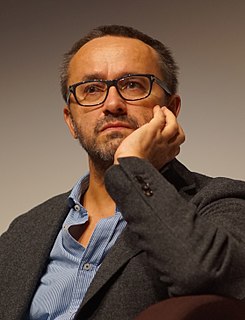A Quote by Elif Batuman
I'm Turkish-American; I was a freshman at Harvard in 1995 and 96. I did teach English in Hungary in the summer of 1996. I'm an autobiographical writer in the sense that whether in fiction or nonfiction, the issues and relationships and phenomena and problems I'm most interested in exploring are the ones I've experienced personally.
Related Quotes
I went to school in California, at Stanford when I was seventeen, and I lived in San Francisco until I was twenty-three, and then I lived in Hungary for, like, a summer, and then I went to Iowa for three years. At Iowa, I actually did the fiction program, not poetry. I was a fiction writer for a long time before I was 'out' as a poet.
There's the fact that American fiction is basically the most apolitical fiction on the globe. A South American writer wouldn't dare think of writing a novel if it didn't allude to the system into which these people are orchestrated - or an Eastern European writer, or a Russian writer, or a Chinese writer. Only American writers are able to imagine that the government and the corporations - all of it - seem to have no effect whatsoever.
Public image is extremely important in American society and I observed personally that the Presidency of John F. Kennedy did much in the public mind for Harvard. Harvard was an excellent school before Kennedy, but Kennedy embodied a new vision for the United States: a leader who caught the world's imagination and that reflected on his alma mater, Harvard.
I wouldn't say I'm fixated on describing any kind of relationship whether it is a father and a son, or a family. I don't like it when people say that I'm particularly following the same line or that I'm only interested in family dramas. I'm interested in human relationships. The most intimate, the most delicate, and the most intriguing relationships are those within a family.
To mystify, in the active sense, is to befuddle, cloud, obscure, mask whatever is going on, whether this be experience, action, or process, or whatever is "the issue." It induces confusion in the sense that there is failure to see what is "really" being experienced, or being done, or going on, and failure to distinguish or discriminate the actual issues. This entails the substitution of false for true constructions of what is being experienced, being done (praxis), or going on (process), and the substitution of false issues for the actual issues.
I think, about the distinction between fiction and nonfiction. Fiction is not really about anything: it is what it is. But nonfiction - and you see this particularly with something like the BBC Samuel Johnson Prize for Non-Fiction - nonfiction we define in relation to what it's about. So, Stalingrad by Antony Beevor. It's "about" Stalingrad. Or, here's a book by Claire Tomalin: it's "about" Charles Dickens.

































